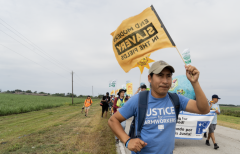Steven Grattan. Al Jazeera. January 20, 2022
Bogota, Colombia – Rights groups and politicians in Colombia have welcomed a decision by the country’s Constitutional Court, which ruled this week that the government failed to consult local communities over its plan to restart aerial fumigation of coca crops.
In a decision on Wednesday, the court said the government of President Ivan Duque could not at this stage move forward with plans to carry out aerial spraying with herbicide glyphosate. It said Bogota must first adequately consult with communities that could be affected.
Coca is the base ingredient of cocaine and is grown widely around Colombia, mostly by poor farmers who either have no other means of income or are forced into growing it by drug trafficking groups.
“The most significant thing about this [ruling] is that the court is protecting various rights that rural farmers, Indigenous and Black communities have,” Pedro Arenas, director of Viso Mutop, a think-tank that promotes drug policy reforms across Colombia, told Al Jazeera.
“The government ignored the voice of the communities,” he said.
Push to restart fumigation
The Colombian government, which has for decades been pressured by the United States to crack down on drugs, has pushed for the restart of aerial fumigation ever since it was banned in the South American nation in 2015.
Earlier that year, the World Health Organization (WHO) linked glyphosate – marketed under the brand name RoundUp in the US – as a probable human carcinogenic.
Duque’s right-wing government had been waiting to see if it met new environmental and health requirements set out by the Constitutional Court in 2019 – a requirement to restart aerial fumigation with glyphosate.
Aerial spraying of glyphosate previously saw rural water supplies contaminated and food crops destroyed in the Colombian countryside, analysts told Al Jazeera.
The Colombian president’s office and the ministry of defence did not respond to Al Jazeera’s requests for comment. Neither has made a public declaration on the ruling yet.
Arenas said the court’s decision highlights the unfulfilled obligation the government had to engage with communities that would be affected by the spraying before it could restart aerial fumigations.
“The planes that the government have ready to spray aren’t going to be able to take off,” Arenas said. “This is an issue that the next president will have to take on. It’s a triumph for these communities and also for environmental and human rights defenders.”
Upcoming elections
Colombia will hold a presidential election at the end of May.
The court’s order means Colombian authorities will have to carry out a consultation process with communities in six planned fumigation areas, which cover 104 municipalities across 14 departments. Government agencies will have one year, extendable by six months, to complete this process.
Colombian politicians took to Twitter to express their views on the ruling.
“I applaud the Constitutional Court. The glyphosate fumigation process is dropped. Value is given to the voice of the communities,” said former presidential candidate and liberal politician Humberto de la Calle.
“It would have been better to have followed the path indicated in the Agreement,” he said, referring to the 2016 peace deal between Bogota and the now-defunct Revolutionary Armed Forces of Colombia (FARC) rebel group.
That agreement had a focus on trying to move rural farmers from illegal to legal crops. Some coca farmers Al Jazeera met in Colombia’s remote south-central region of Guaviare last year said they would gladly move away from the illegal crop if there were profitable alternatives.
But conservative senator Paloma Valencia said the court’s decision “condemns Colombia to live in the midst of drug trafficking”. She tweeted: “Fumigation is not the only tool, but it is a very important one.”
‘It doesn’t work’
Experts have questioned whether glyphosate fumigation is the best tool available – or whether it will actually lead to a reduction in coca production in Colombia.
Elizabeth Dickinson, a senior Colombia analyst at the International Crisis Group, told Al Jazeera that aerial fumigation is a controversial strategy because “it doesn’t work” from a policy point of view.
“There have been many studies about the cost-effectiveness of fumigation and basically what they have proven is that it’s an extremely costly strategy that has very little effect on reducing the amount of coca grown in Colombia,” said Dickinson. “Historically what has happened is if you fumigate in one place, the coca moves to another place.”
She also said the health and environmental effects of the eradication method are “really devastating”.
“Because it’s toxic gas coming out of an aeroplane, it’s not as if you can direct it in a surgical way towards only the coca crops, the entire landscape is affected,” Dickinson said. “Many have their food crops mixed in with the coca, so when there is fumigation, they lose everything.”
She said while she did not think the aerial fumigation issue will figure prominently in Colombia’s election campaign, “fumigation is going to be very, very hard for a new government to reopen”.
The Constitutional Court’s decision, she said, “raises the bar on what the government is required to agree upon with the communities and essentially forces the government to make fumigation a negotiated strategy, rather than simply imposing it as has been the case in the past”.


